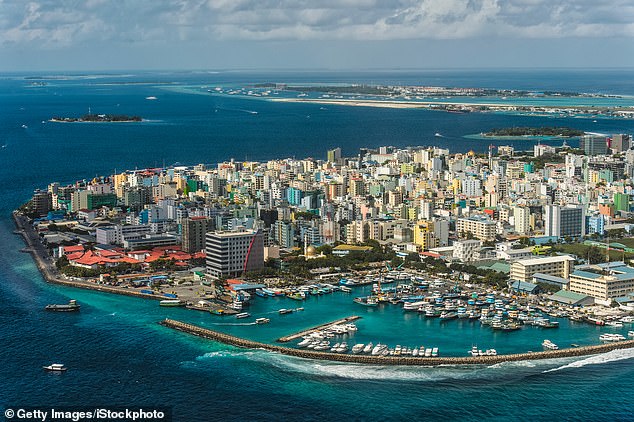Share this @internewscast.com
The Maldives has made history by becoming the first country to implement a generational smoking ban.
As of this month, any individual born on or after January 1, 2007, or currently aged 18 or younger, is prohibited from purchasing, using, or smoking tobacco products within the nation.
Announcing the groundbreaking measure, the country’s health ministry stated that the ban encompasses all tobacco forms, and retailers must verify the age of purchasers before completing a sale.
This initiative reflects the Maldives’ “strong commitment to shielding young people from the dangers of tobacco,” according to the ministry.
The ban is also expected to impact tourists visiting the Maldives, which hosts over two million visitors annually. Those born after the 2007 cut-off will face the same restrictions on buying cigarettes.
With a population of around 500,000, the Maldives already prohibits the sale of vapes and e-cigarettes. Last year, the country doubled cigarette import taxes, escalating the cost of a pack from approximately $7 to $16.
An estimated 25 percent of adults in the country smoke, mostly men, while among those aged 13 to 15 years, nearly half use some form of tobacco product. Sixty-three percent also say that social media influencers have made smoking look cool.
Overall, about 203 people in the country die from smoking-related complications every year, equivalent to 12 percent of all deaths.

The Maldives has become the first nation in the world to implement a generational smoking ban. Pictured above is an aerial view of the Maldivian capital Male
In the US, for comparison, about 20 percent of adults smoke cigarettes, while about 10 percent of 11 to 18-year-olds report using tobacco. More than 480,000 smoking-linked deaths are reported in the country annually, or 15 percent of the total.
While in the UK, about 12 percent of adults smoke, while 11 percent of 11 to 15-year-olds say they have used cigarettes. There are about 75,000 smoking-related deaths in the country every year, or about 13 percent of the total fatalities.
Other nations have also tried to bring in similar generational bans on cigarettes.
In 2022, New Zealand passed a world-first law that would have permanently outlawed the sale of tobacco to anyone born after January 1, 2009, effectively phasing out smoking for future generations.
The measure, set to take effect in 2024, was later repealed to help fund government tax cuts.
In the UK, officials proposed a comparable ban on cigarette sales for those born after the same date, but the legislation ultimately failed to pass through its Parliament.
In the Maldives, those found to be breaking the generational smoking ban could be fined $3,200, officials say, while those found to be using a vape device could be fined $320.
The nation’s generational smoking ban came into force after it was approved by the country’s president Dr Mohamed Muizzu, who is an engineer by training, and has cleared the way for it to become law.
His wife and the nation’s First Lady, Sajidha Mohamed, heralded the ban as a ‘historic step’ and a ‘proud moment’ for the nation.
Writing on X, she said: ‘Today, we take a historic step towards a tobacco-free Maldives.

The Maldivian President Dr Mohamed Muizzu approved the smoking ban. Above, he speaks at The Summit of the Future in New York in 2024

Other nations have also considered bringing in generational smoking bans including New Zealand and the UK (file photo)
‘As a healthcare advocate, I applaud the Government’s leadership in launching the Generational Ban on Tobacco, a powerful investment in the well-being of generations to come.
‘This is a bold, evidence-based step to break the cycle of addiction and prevent disease. We are securing a healthier, stronger future for our youth.’
There are already suggestions that the nation is struggling to implement its smoking ban and cigarette regulations.
Deputy speaker of the Maldivian parliament, Ahmed Nazim, said last month that smuggled cigarettes and vaping devices remain ‘widely available’ in the country.
He also said that they were ‘sold openly through social media’, and added that, on the black market, vapes were ‘still cheaper than cigarettes.’
The Maldives Independent, a national publication, reports that the number of smuggled cigarettes entering the country now exceeds legal ones.
It cites instances, including when 200 cartons of cigarettes were discovered on an oil tanker and where hundreds of cases of cigarettes were cleared from a bonded warehouse, a secured facility regulated by customs services, without being authorized.










